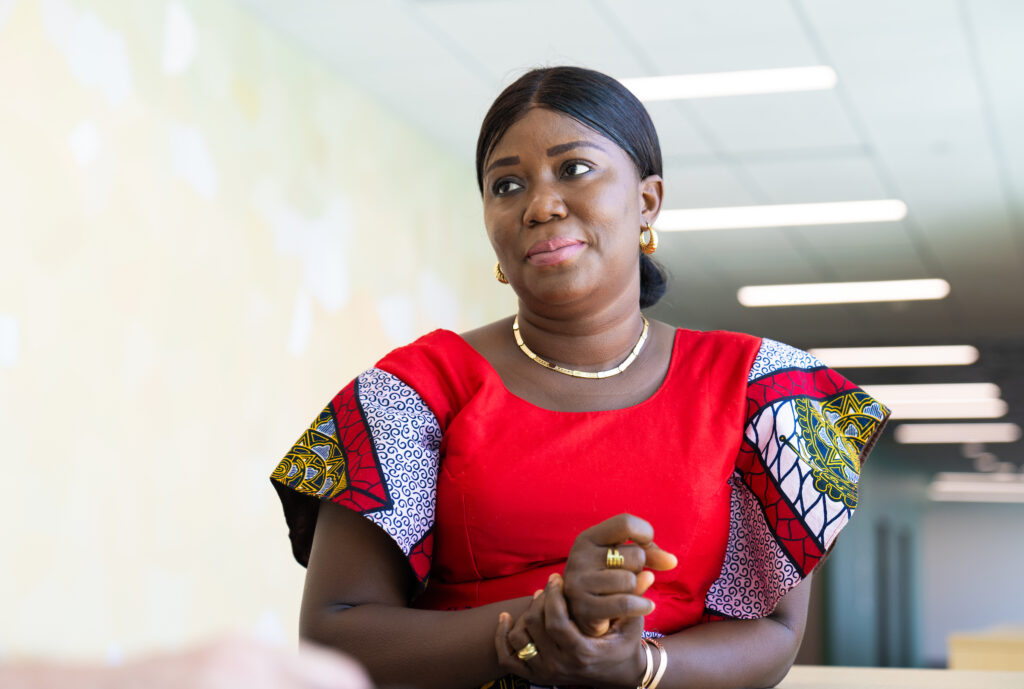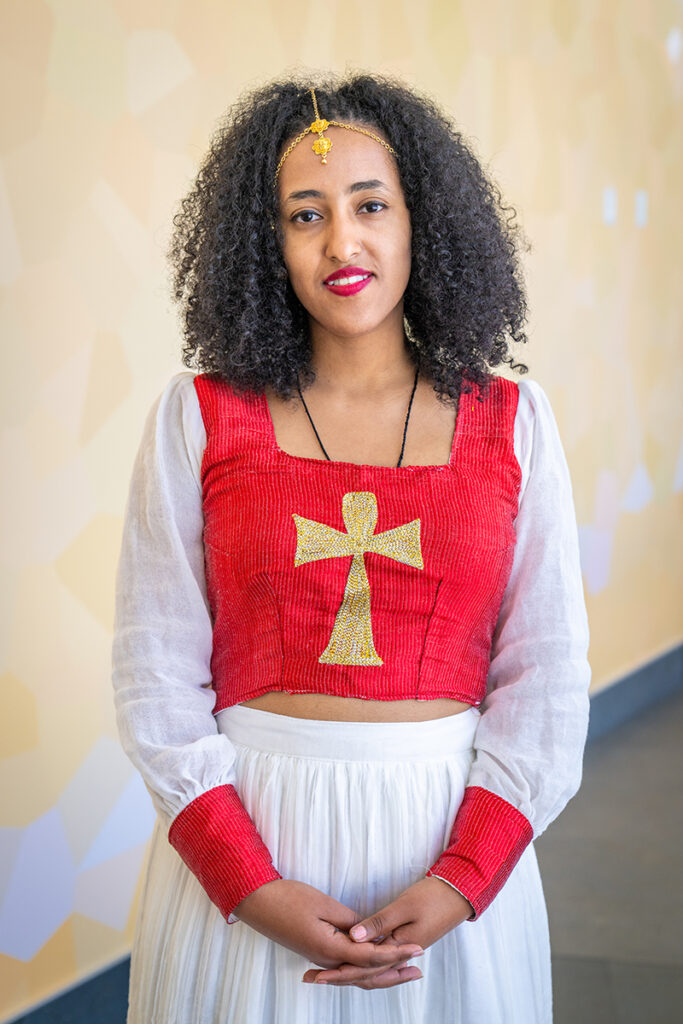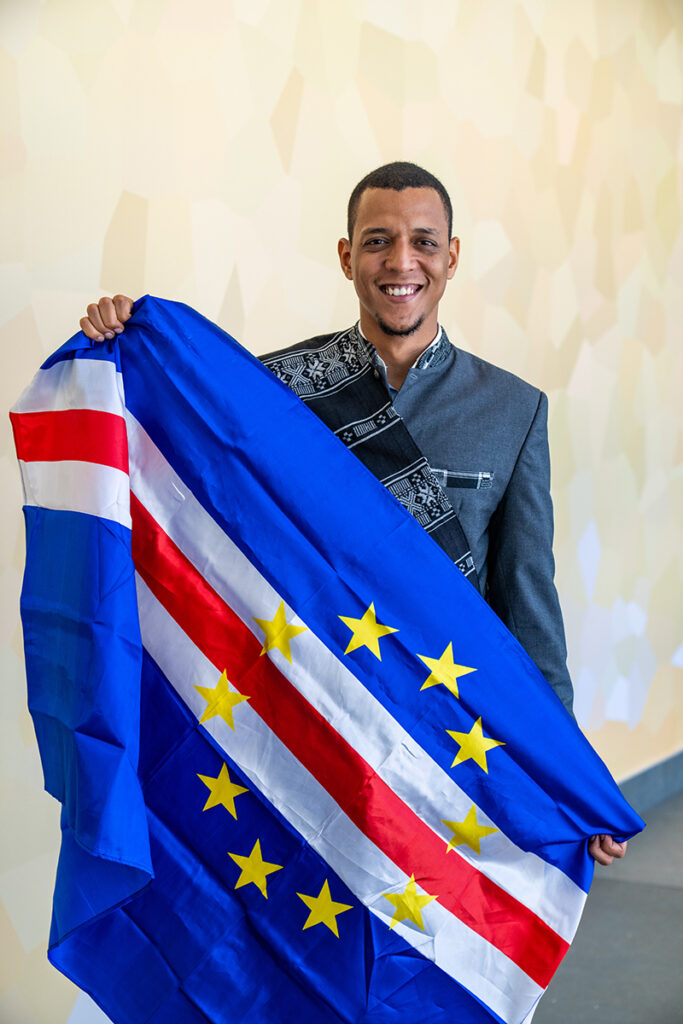Young African leaders build on civic engagement skills at FGCU
- Drew Sterwald
- News
- Contributors: James Greco and Kyle McCurry, Photos; Godwin Henry, Video
Corina Wornee described her experience participating in the Mandela Washington Fellowship Institute at Florida Gulf Coast University as nothing short of “a new era” dawning for her.
A registered nurse and educator in Liberia, Wornee was one of 25 young African leaders chosen for the institute who are civically engaged and serving the public through nongovernmental organizations (NGO), community-based organizations or volunteerism. What she learned about leadership and community partnerships while at FGCU June 21-July 30 gave her hope and inspiration to build more educational opportunities for children in Liberia. The country is where she established a four-room school last year, she said.
“Interacting with world-class teachers here and improving my leadership skills has been mind-blowing,” she said. “It has helped me see beyond where I am. It tells me that as a young leader, there’s so much I should look forward to when developing my country, and it has challenged me to be a better person. It has challenged me to make my country the way I see other countries. It takes time, but we will get there.”

Wornee works for the Luminos Fund, an international organization that recruits children and adolescents who have never been in school and prepares them to transition to public school. People in Liberia live on less than a dollar a day, she said, so it is difficult for families to prioritize sending children to school when they are searching for food to feed them at the same time.
The two dozen African community leaders who came to FGCU attended workshops and seminars on building technical and leadership skills in areas such as advocacy, strategic planning, organizational development and the intersection of civil society with business and government.
The Mandela Washington Fellowship for Young African Leaders is the flagship program of the Young African Leaders Initiative, a program of the U.S. Department of State’s Bureau of Educational and Cultural Affairs administered by the nonprofit International Research & Exchanges Board (IREX). Since 2014, nearly 6,500 representatives from every country in Sub-Saharan Africa have participated.
“Each one of us here have our own communities that we are busy developing back home,” said Nelao Emmanuel, who works to promote education for adolescents with disabilities in Namibia. “At FGCU, our shepherds have been so good in helping us on our leadership skills because they understand where we are coming from. I got to really understand that my voice matters, that I have a lot of other people attached to my voice. We are like small catalysts, the mini ones that are making an impact.”
With the knowledge she gained through the institute, she hopes to expand the scope of her vision and push it forward more strategically, she said.
The two dozen African community leaders who came to FGCU attended workshops and seminars on building technical and leadership skills in areas such as advocacy, strategic planning, organizational development and the intersection of civil society with business and government.
The Mandela Washington Fellowship for Young African Leaders is the flagship program of the Young African Leaders Initiative, a program of the U.S. Department of State’s Bureau of Educational and Cultural Affairs administered by the nonprofit International Research & Exchanges Board (IREX). Since 2014, nearly 6,500 representatives from every country in Sub-Saharan Africa have participated.
“Each one of us here have our own communities that we are busy developing back home,” said Nelao Emmanuel, who works to promote education for adolescents with disabilities in Namibia. “At FGCU, our shepherds have been so good in helping us on our leadership skills because they understand where we are coming from. I got to really understand that my voice matters, that I have a lot of other people attached to my voice. We are like small catalysts, the mini ones that are making an impact.”
With the knowledge she gained through the institute, she hopes to expand the scope of her vision and push it forward more strategically, she said.
Bezawit Fantu Woldeyesus, who works for the nonprofit Girl Effect — which supports education, health and livelihoods for adolescent girls in Ethiopia — was similarly inspired by FGCU’s service-learning model.
“Nothing like that exists back home,” she said about service as part of the university experience. “It amazes me how much the U.S. has been able to accomplish with people willing and able to give time or resources, making use of people who have skills and experience to help those who have less. We need to inculcate that culture of volunteering. Giving back is not always about giving money.”
Seeing how these young leaders absorbed information and networked with their peers and FGCU faculty and staff impressed Ally Zhou. The director of FGCU’s Center for the Study of Race, Gender, Ethnicity and Culture, she served as the institute’s academic director along with Precious Gunter, FGCU’s chief equity, ethics and compliance officer and Title IX coordinator.
“I’ve seen how quickly they are applying the leadership skills they’ve learned here to their practice back home,” Zhou said. “We’re so glad they’re here. It’s a great opportunity to allow our community to share cultures and knowledge.”

"We were so honored to host the Mandela Washington Fellows at FGCU. It was a mutual learning experience that we will continue to build on so we can share and learn from each other’s transformational experiences. We have built incredible ties with them, and I know they will carry FGCU's commitments to the community and our best practices for civic engagement back home with them to Africa. They are now part of the Eagle Family, and we will always be in touch."
FGCU President Aysegul Timur

For Nestor Andrade, the institute has been about sharing and gaining new perspectives. He’s the founder and president of Raboita, an NGO that develops educational and motivational projects for adolescents in Cabo Verde, an island off Africa’s west coast.
“First of all, we are meeting Africans outside Africa,” he said. “So just imagine: We are 25 African leaders, and we are from 22 different countries. It’s been about changing the perspective, figuring out different ways of thinking and also networking with people here that can help me grow and see things from the different angles. We are here to serve and to leave this place as a better place than we found it.”
The Mandela Washington Fellowship is a program of the U.S. Department of State with funding provided by the U.S. Government and administered by IREX. Florida Gulf Coast University is a sub-grantee of IREX and has implemented Leadership Institutes as a part of the Fellowship since 2023. For more information about the Mandela Washington Fellowship, please visit the Fellowship’s website at www.mandelawashingtonfellowship.org.